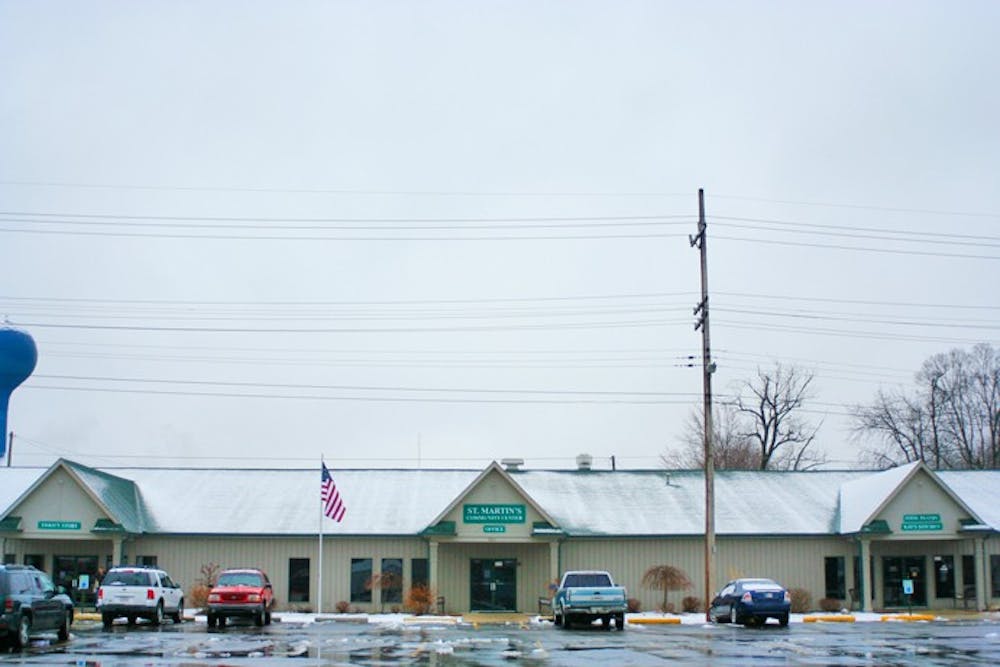By Nicole Arpin | Echo
Every day at 10:45 a.m., two men join rapidly-forming lines. One man, a Taylor University student, meanders to the dining commons in plenty of time for lunch at 11:00 a.m. He devoured his large breakfast just before chapel, so his stomach isn't quite ready for lunch yet, but this slot is the only time his schedule allows. As he checks his email on his iPhone, he overhears other smartphone-toting students in a half-hearted conversation.
"I'm starving," a girl complains. "I had to skip breakfast for my 8 a.m."
Only 13.8 miles away, another man steps into a long line. His stomach squirms, shrieks and shouts, "I'm empty!" The woman in front of him juggles a baby on her hip while scolding the small children darting between her legs. A crowd of migrant workers shuffle behind, chattering cheerfully in their native tongues. Soon, hundreds of wildly diverse people will compose this long line, united in one need: their hunger.
Each member of this second line waits expectantly for a loud bell to ring and signal the filling of their empty stomachs. As the noise dies down, a small woman steps to the front of the line. The hungry group silences in respect and removes their hats before this curly-haired, bespectacled saint blesses the food.
Teresa Campbell, director of St. Martin Community Center in Marion, Ind., knows how to feed her neighbors. For the past 50 years, Campbell's family members have worked to reverse the painful effects of poverty and hunger in their downtown Marion neighborhood.
"My mom and her sister started (St. Martin's) in 1968. It just kept growing and went from just a few people to begin with to now we're serving 8,000 meals a month. It's astronomical. God has shown favor to St. Martin's," said Campbell.
St. Martin's serves far beyond its soup kitchen. The community center also hosts a large thrift shop which funds its breakfast and lunch programs. In addition, the center operates a food pantry which provides basic food items to needy families. These other services aid St. Martin's patrons, who are often forced to choose between food, medicine and shelter, according to Campbell.
Marion wasn't always so deeply affected by poverty. When Campbell was young, jobs were plentiful at the Ball Glass, RCA and wire factories.
"During that time when jobs were plentiful, the need for education was not expressed within families. You could quit school at 15 and go get a job and support your family," Campbell said.
Unfortunately, most of the factories themselves have closed; the companies that owned them left Marion in the past 30 years or so. When the factories left, so did Marion's jobs.
"In short, the jobs are gone. Glass was changed over to plasticware, so those factories closed. We have mostly cell phones and don't need telephone wires anymore. During that transition, all the wire factories went down," Campbell said.
As jobs left Marion, families did not adapt well. Many continued to encourage high school students to drop out. Campbell sees this failure to adjust as the first step toward systemic, generational poverty.
"When the jobs started moving out, the thought of having a job and going to school was gone. Sixteen (years old) was the standard, and then you quit school. Without the jobs to take that place, you just start falling into deeper poverty," Campbell said.
As one of the four poorest counties in the state, Grant County faces more than hunger issues. The Marion Chronicle-Tribune reports that child abuse cases rose from 1,154 in 2012 to 2,165 in 2013. In that article, the Prevent Child Abuse vice president detailed some of her reasons behind the rising amount of neglect cases.
"This winter has been hard on a lot of people. You don't have heat in the home, so then you have children who are being neglected because they're cold. It all plays into that role of neglect. It's a vicious cycle," she said.
Campbell and her team at St. Martin's hope to witness into this dark and hurting community of broken individuals.
"I love them. I love them and I want something good for them," Campbell said.
She knows that despite her love for the people, she cannot create perfect solutions for them.
"Jesus said, 'The poor will always be with you,' and that is so true. I remind myself of that because it helps me keep going that he knew that there was no magic bullet to fix that problem," Campbell said.
Even though large-scale societal change is difficult, Campbell finds hope on an individual level.
"We help to make their lives better and to spread the Gospel by example and word. That's why we have hope. We know that we're doing good things, even though it takes a lot of time to see change and improvement," Campbell said.
By satisfying basic needs, Campbell sees an opportunity to fill spiritual hunger as well.
"If you're not warm and fed with those fundamental things that you need to be safe and satisfied, then you're looking for those things, you're not looking for God. You're looking for those things to fill that void," Campbell said.
Campbell hopes Taylor students will come help fill spiritual and emotional needs of St. Martin's neighbors.
"You don't even have to work. Just come in, get a tray and sit beside the people and talk to those around you. Ask them how they're doing. If they get used to seeing you then they start knowing something's different about you. When they know there's something different, it gives them something to hope for that this isn't all there is," Campbell said.
(Thumbnail photograph by Matt Morse)


